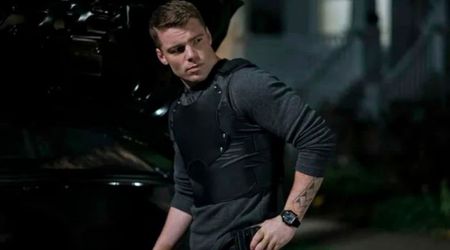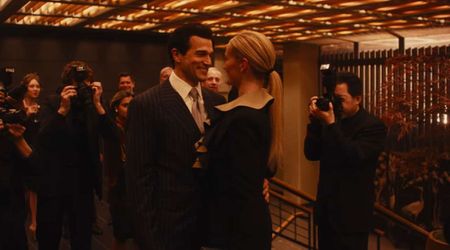Unapologetically ruthless, Claire Underwood is the anti-heroine House of Cards needs post #MeToo

A product of nightmarish grit and unquenchable ambition, Frank Underwood, president of the most powerful nation in Netflix's fictional set-up, finally succumbed to despair by the end of the fifth season of 'House of Cards'. A critically-acclaimed prestige drama series that has not only appealed to the audience due to its intellectual subject material but also because of its recent scandal-grappled course of events.
The Frank character, despite a range of outrageous Machiavellian maneuvers, felt the reality of powers slowly slipping out of his hands during the end of the season. On one hand, the number of criminal allegations against him had peaked, and on the other hand, his wife's gradual revelation of her own cunning and scheming has begun to come to the forefront.
In a truly catastrophic aside, the political drama ended its last season with Claire Underwood's rise to power - a step exemplified with the new anti-heroine stubbing her cigarette against the flag and then turning towards the camera to finally break down the fourth wall for Claire. The former First Lady-turned-U.S. president uses the final scenes to send chills down the spine and simultaneously announce her reign with two prophetic words - "My turn".
It was quite evident that Claire had taken over. After five seasons of playing Lady Macbeth to her husband, chastising his ears with the 'valor of her tongue', the character rightfully brought to life by Robin Wright, had finally tasted success that belonged solely to her.
And in those defining moments, Claire, who has developed quite a fan-following with her steely conduct and that layered complexity of her character, was ruthless. Her hunger for power evident. And in a surprising twist to the whole aside to the audience element, her means to the end was shrouded in mystery.
"Just to be clear, it's not that I haven't always known you were there," she says in the eleventh episode of season 5, fixing her glare into the camera and addressing the big elephant in the room.
"It's that I have mixed feelings about you. I question your intentions. And I'm ambivalent about attention. But don't take it personally. It's how I feel about most everybody." For those living under a rock, Wright's character was talking directly to the viewers in the middle of a fictional narrative. While her style alluded to Frank's frequent discourse with the camera, her words betrayed her purpose.
Why is she so ambiguous? What's her intention? And why talk about attention?
Claire couldn't have possibly predicted the future course of action. Fast forward to October 29, 2017 (almost five months after the chilling season finale), a fresh wave of serious allegations rocked Hollywood, especially the cast of Netflix's House of Cards. Broadway veteran and celebrated actor Kevin Spacey had been accused of sexual harassment. At the center of a sex assault scandal, the two-time Oscar winner faced charges of making unwanted sexual advances towards Star Trek: Discovery actor Anthony Rapp, when Rapp was 14.
An explosive report by Buzzfeed had brought the issue to the front following which at least 30 more people came forward with their account of ordeals at the hands of Spacey. What followed next was Hollywood's syndrome of isolation. In an attempt to maintain distance from the disgraced actor, his publicist dropped him, Ridley Scott's film 'All the Money in the World' replaced him, and Netflix took the sternest step, announcing a Spacey-less season 6.
It's rare, but it's one of those occurrences where life imitated art. With the ghost of Frank Underwood still lurking over the production, the streaming giant announced that it would be moving forward with season 6 of 'House of Cards' with Wright-played Claire at the front and center of all action.
Later during the 2018 Academy Awards, Netflix put a final nail on the Spacey-shaped coffin by debuting the first-look teaser for the sixth and final season of 'House of Cards'. Without giving away much about the plot, the brief clip, replete with the haunting background score by Jeff Beal, introduced a new presidential arsenal and the first female president in the show, Claire Underwood.
"We are just getting started," Claire says, looking straight into the cameras as "hail to the chief" flashes on the screen.
Apart from a long bob and a more military-style blue button-up jacket, not much of Claire's physical appearance seems to have changed. The new president sports her signature smirk in the teaser, only this time emboldened by the power of her position.
Claire's reign has clearly begun and her ascension to the presidency was just a matter of time. A true follower of the show would have picked up the bits and pieces of this current storyline early on in the show - with or without the dismissal of Spacey, and hence of Frank Underwood. While an older and frailing Frank writhed and ranted in his quest for power, his silent understudy efficiently picked up the tricks of the trade.
Whether it is the tackling of the leak of her abortion news (spinning it in her favor by turning the news into a public agenda against Gen. Dalton McGinnis, who raped her) or her navigation through difficult political gridlocks, Claire shows her acumen in political and diplomatic matters quite frequently. It is, in fact, during her interactions with Russian President Viktor Petrov, that the true colors of her character come to light.
Without breaking a sweat, as a First lady, Claire waltzes her way out of the most tricky situations, leaving a delighted Petrov with the idea that she is an ally. Later in her role, as the Vice President, against the very wishes of her husband, Claire confronts Petrov on the delicate matter of LGBTQ tolerance, leaving the Russian head dumbfounded and adding to her own popularity in the public opinion in the process.
From being a moderately successful ambassador to the UN to rising to the ranks of the Vice President, an acting president, and ultimately to the highest office in the American administration, her transformation wasn't something that happened over time. It was a calculated move, a careful pawn reserved for the right time. Just when the plot thickened - both within and outside of the show - Claire takes the oval office, almost like poetic justice.
But don't mistake her ascension to be free of cunning and conniving characteristics. Until season 5, the alter ego of Frank Underwood had seemingly kept her hands clean of criminal indulgences but that changes as soon as she takes it upon herself to put her lover Tom Yates to sleep (quite literally).
The brand of politics that Claire is indulging in, is ruthless and unpredictable, to say the least. With Frank, you could always be sure that he is going to put himself first (at times even before the interests of Claire) and his moral compass clearly doesn't point North at all times. But his successor is humane in rare moments, she has exhibited selfless sides to her personality and her flawed character only makes her more relatable.
However, a combination of humane and conniving is something beyond my understanding. Claire's layered and convoluted character lends her a charm and a steely spine worthy of the post-MeToo atmosphere.
The question is not what America would look like with a different Underwood in charge, but how new showrunners Frank Pugliese and Melissa James Gibson could use the opportunity to spin the direction of 'House of Cards'. If life imitates art once again, perhaps this infamous drama might have some real-life wisdom apt for the current socio-political climate.










